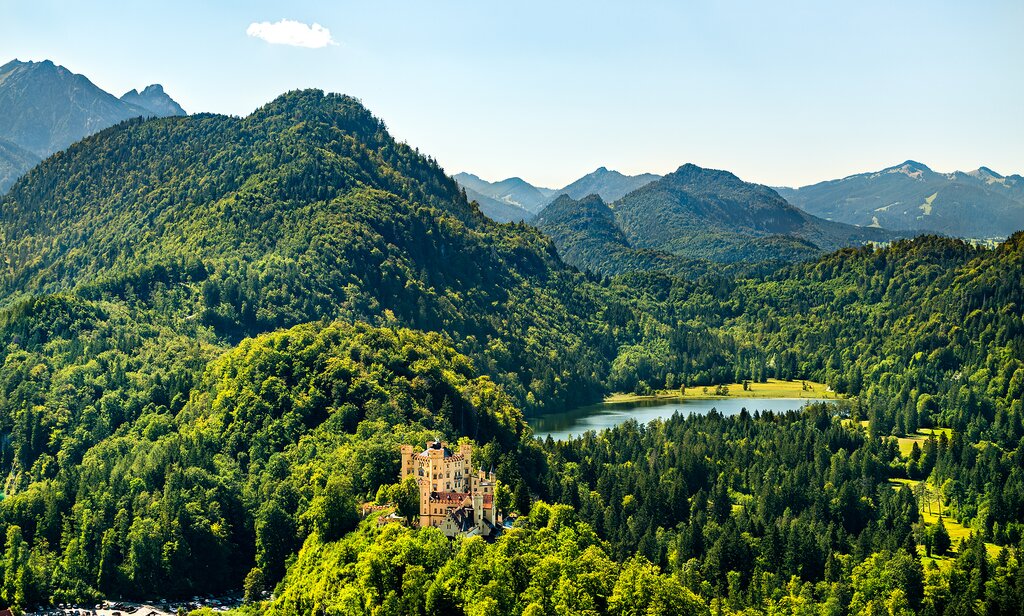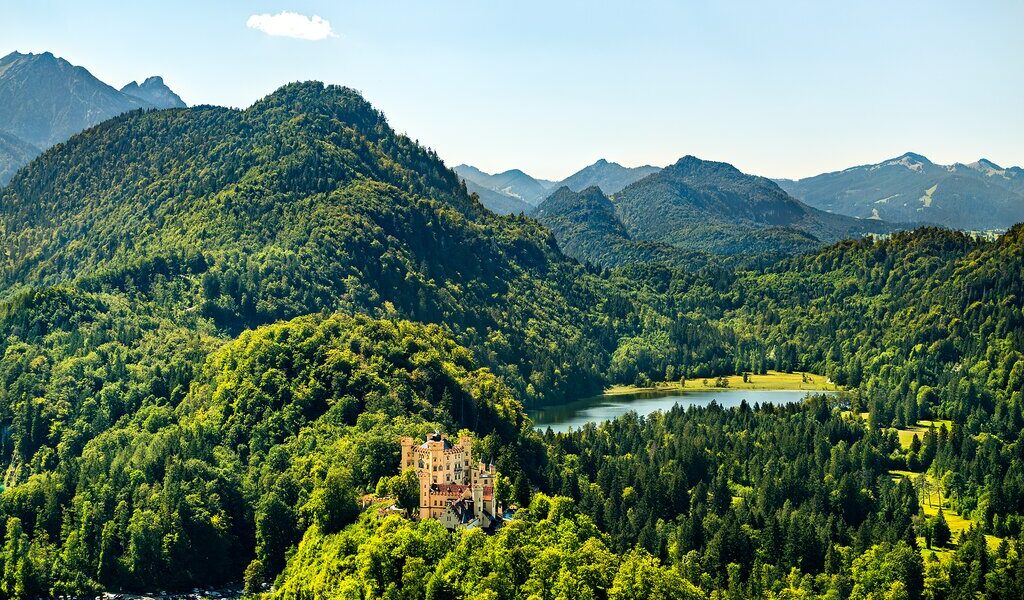
In July, summer is in full force in Germany, beckoning visitors with warm sunshine and fun activities. This is a great time to plan a city break, while those looking to skip the crowds can head for smaller towns and lesser-known destinations—especially those near beaches and lakes (and there are plenty of both).
## Discovering Germany in July: A Comprehensive Guide
July in Germany marks the heart of *Sommer*, a season brimming with radiant sunshine and extended daylight, inviting both locals and visitors to embrace the outdoors. The sun makes its grand entrance before 5:30 am and gracefully bows out after 9 pm, offering ample time for exploration and enjoyment. It’s a time of year when Germany truly comes alive.
Around mid-July, temperatures typically reach their peak, making July and August the warmest months, especially in the southern regions where humidity adds to the warmth. When planning your itinerary, it’s helpful to understand the nuances of the German climate. For instance, in **Berlin**, the vibrant capital, you can expect an average daily high of 75°F (24°C) and a comfortable low of 59°F (15°C). **Frankfurt**, often considered Germany’s warmest city, boasts an average daily high of 79°F (26°C) and an average low of 61°F (16°C). However, the temperature varies from the north to the south.
Venture into the **Bavarian Alps**, and you’ll experience a slightly cooler climate due to the higher altitude. This is particularly true near **Zugspitze**, Germany’s highest peak, where the air is crisp and refreshing. Conversely, the coastal areas of Northern Germany benefit from pleasant, cooling breezes that temper the summer heat.
To make the most of your German adventure in July, it’s wise to pack accordingly. Lightweight and breathable summer clothing is essential, along with a layer or two for the cooler early mornings and late evenings. Don’t forget sunscreen to protect yourself from the sun’s rays during sightseeing and outdoor activities. While sunshine is abundant, brief rain showers are common in July, often followed by a return to sunny skies. A light rain jacket or umbrella will ensure you’re prepared for any unexpected weather changes.
The allure of pleasant weather, combined with school and work vacations in the Northern Hemisphere, makes July one of the busiest and most expensive months to visit Germany. Airfares and accommodations tend to reach their highest rates, and popular attractions draw larger crowds. Planning ahead is crucial to ensure your travel plans go smoothly.
Booking accommodations and activities well in advance is highly recommended, especially for those with limited availability. If you have specific hotels or restaurants in mind, making reservations is essential to avoid disappointment.
Germany boasts a robust infrastructure with well-maintained roads and efficient train routes, facilitating easy travel throughout the country. If you’re seeking a well-rounded trip, here are some itinerary options to enjoy:
Consider starting your journey in the north, as July is an ideal time to explore the coastline south of the Danish border. Begin your adventure in the lively harbor city of **Hamburg**, then rent a car to explore the long stretches of sandy beaches and nearby islands. **Rügen Island**, where Albert Einstein once spent his vacations, offers a tranquil escape. Alternatively, discover the car-free charm of **Hiddensee Island**.
The bustling city of **Berlin** is particularly vibrant in July, with crowds eager to explore its famous landmarks and museums. If you thrive on urban energy, Berlin is the place to be. From there, you can take a train to the UNESCO-listed city of **Potsdam** and marvel at **Sanssouci Palace**, often referred to as the “Versailles of Germany.” You can also take a trip to the city of **Dresden**, known for its manicured gardens and magnificent Baroque architecture. For a change of scenery, rent a car and venture to **Saxon Switzerland National Park**, located on the border with the Czech Republic. This natural wonderland, less than three hours by car from Berlin, features dramatic sandstone towers and offers excellent hiking and rock climbing opportunities.
**Munich**, the capital of Bavaria, serves as an excellent base for historical day trips. From Munich, visit charming cities like **Nuremberg** and **Stuttgart**, both easily accessible by train. However, renting a car will allow you to explore lesser-known gems, particularly the picturesque lakes in the region, often surrounded by majestic mountains. Popular choices include **Ammersee**, less than an hour’s drive from Munich, and **Eibsee**, located at the foot of the towering **Zugspitze** mountain.
If your travels take you to **Frankfurt**, consider planning an excursion through the enchanting **Black Forest**. This region, with its captivating landscapes, inspired the fairy tales of the Brothers Grimm. Base yourself in the medieval city of **Freiburg**, where you’ll find nearby hiking trails, serene lakes, and even wine tasting events throughout the month.
For many, the northern beaches offer a haven for peace and relaxation. Coastal hikes, beach walks, bike paths, and horseback riding trails are all available, depending on the specific beach you choose. If you prefer freshwater lakes, the pristine alpine lakes scattered throughout southern **Bavaria** offer a range of activities, including sailing, windsurfing, fishing, and speedboat rentals. Many of these lakes are also surrounded by hiking and mountain biking trails. You can spend your morning exploring alpine trails, surrounded by beautiful nature, and then cool off with a refreshing swim in a nearby lake.
One particularly scenic route is the walking trail around the crystal-clear lake of **Alpsee**, nestled between the fairytale castles of **Hohenschwangau** and **Neuschwanstein**, offering stunning viewpoints along the way. With thousands of castles scattered throughout Germany, you can easily incorporate castle visits into your travel plans, no matter where you go.
Germany’s rivers also offer unique experiences, including boat cruises, canoe and kayak rentals, and scenic excursions. If you’re traveling near the **Rhine** and **Mosel** rivers, be sure to visit the wineries in the **Mosel-Saar-Ruwer** wine region, known for its world-class white wines. A good base for exploring this region is the town of **Bernkastel-Kues**, which provides easy access to the terraced vineyards on either side of the Mosel River. Don’t miss the chance to visit the wine museum, where you can sample and purchase a variety of wines from the region. And of course, don’t forget to experience the charming *biergärten* that are found all over Germany during this time of year.
Here are some of the unique events in Germany during July:
**Freiburg Wine Tasting, Freiburg:** Held in late July, this annual event celebrates the wines from the vineyards of the Black Forest. A perfect stop for wine connoisseurs.
**Munich Opera Festival, Munich:** Dating back to the 19th century, the capital of Bavaria hosts live opera, choral, and ballet performances at some of the city’s best venues throughout July. If tickets are sold out, there are free live feeds shown at the large square called Max-Joseph-Platz.
**Classic Open-Air Gendarmenmarkt, Berlin:** The capital hosts its own music series with opera, classical, and modern performances in an open-air setting at the historic square of Gendarmenmarkt.
**Klassic Open Air, Nuremberg:** Enjoy free classical music concerts held in Nuremberg’s beautiful Luitpoldhain (Luitpold Grove) park in July and August. It’s a beautiful opportunity to enjoy nature and the classics.
**CSD, Berlin:** Germany celebrates gay pride with colorful parades and events, usually held in late July. The largest celebration takes place in Berlin (dubbed Christopher Street Day), as well as in the city of Cologne.
**Kinderzechem, Dinkelsbühl:** This family-friendly festival in mid-July celebrates the town of Dinkelsbühl’s history in the Thirty Years’ War with traditional dancing and pageants. A great stop for those driving the Romantic Road.
B-911

